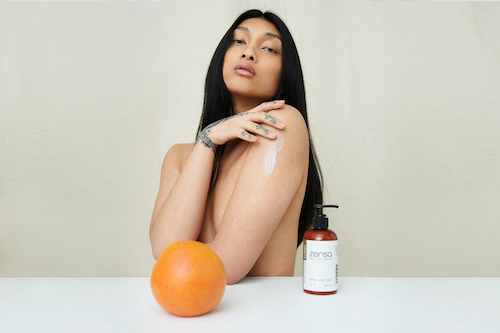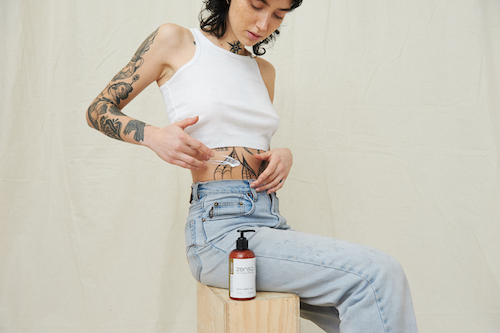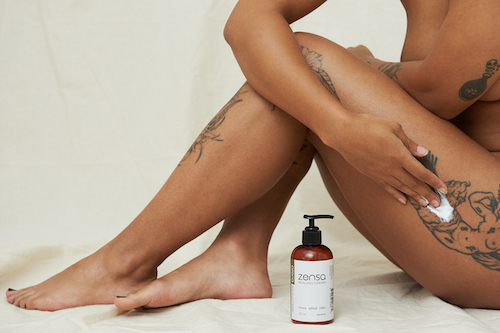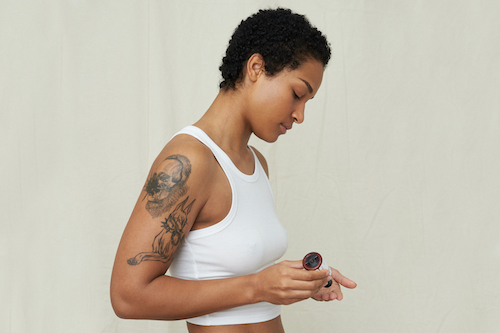Benefits of Aloe Vera For Skin: Your Full Guide
Benefits of Aloe Vera For Skin: Your Full Guide
The benefits of aloe vera for the skin go well beyond after-sun recovery. The cactus plant contains aloe vera gel, the substance inside its leaves, and is a popular herbal remedy that’s been used for centuries. When applied topically, aloe vera has a cooling and anti-inflammatory effect on the skin. It is rich in vitamins A, C, E and B12 and contains over 75 active elements, including antioxidants, enzymes, minerals, amino acids, and salicylic acids. Aloe vera gel for the face or body soothes and clears your complexion from healing short-term infection or irritation to calming prolonged inflammation and uneven skin texture, itchiness and more.

The aloe vera plant offers an effective (and affordable) natural alternative to commercial ointments, healing creams, face or body moisturizers and is suitable for sensitive skin. You can use aloe vera gel on its own or combine it with ingredients like lemon, coconut oil, honey, colloidal oatmeal or turmeric to make a face mask tailored to your unique skin concern. Do a patch test on a small area of skin if you’ve never used aloe vera before to ensure that you’re not allergic.
Read on to discover the benefits of aloe vera for the skin, how to use it and why it is effective for treating common skin conditions (or tattoos during the after-care process).
Soothes Minor Cuts, Scrapes & Burns
Aloe vera is a common at-home sunburn relief treatment – and for good reason. The gel-like substance contains aloin, an antioxidant-rich compound with proven anti-inflammatory benefits. A 2019 study found that aloe vera is a safe and effective way to treat first-degree (red, non-blistered skin) and second-degree (blistered, thickened skin) burns. Sunburns typically are first-degree burns. While aloe vera can be an effective treatment, prevention is the best protection against sun damage. Always remember to apply sunscreen with at least SPF 30 to your face and body before going out into direct sunlight. For sunburns, use the aloe vera 5-6 times daily for around 7 days to see the best results.

Researchers found that applying aloe vera to this mildly-injured skin shortens skin healing time, prevents infection and reduces uncomfortable symptoms like redness and itchiness. It offers anti-fungal, anti-bacterial and anti-viral properties to protect skin during the repair process. The gel moisturizes the skin to help prevent peeling (a common side effect of sunburns). Together, these benefits work to strengthen the skin barrier for increased cell turnover and quicker recovery.
Aloe vera can reduce the pain, potential infection and healing time for minor cuts and scrapes. Never put aloe vera on a bleeding or open cut. Make sure it stops bleeding, and wash it with mild soap and water before applying aloe vera. Once the scrape starts forming a scab, use a thin layer of aloe vera on the wounded area to limit burning, itching and keep bacteria or other germs from irritating the skin.
Contact a doctor or dermatologist immediately if your burn or cut looks more severe or feels more than mildly painful.
Accelerates Wound-Healing
Aloe vera has been clinically shown to promote and speed up the wound healing process. Results from the same 2019 study confirm that aloe vera is an ideal wound dressing and effective primary or secondary treatment option. The plant’s antioxidant-rich profile stimulates an anti-inflammatory response that boosts collagen production and provides a cooling effect when applied to the skin. Aloe vera helps the skin retain moisture and protects its integrity to strengthen the skin barrier. Its properties increase cellular turnover to repair the damaged skin more quickly and accelerate the wound-healing process.
The wound-healing benefits of aloe vera make it ideal for use during the tattoo after-care process. Optimal tattoo after-care includes focusing on two main benefits: hydrating the area and protecting the wound from infection. The plant’s anti-bacterial, anti-fungal and anti-viral compounds shield the area from germs, dirt and other unwanted irritants. It also moisturizes the new tattoo to prevent dry skin, cracked ink and protect the skin barrier. Keep the fresh ink hydrated to preserve the tattoo’s appearance as it heals and prevents skin rashes, itching, excessive peeling.

Zensa Healing Cream contains calendula and grapefruit oil to reduce irritation and speed up healing. It also includes non-medicinal ingredients, including Aloe Barbadenis Leaf Extract (another name for Aloe Vera), shea butter, cucumber extract and avocado oil to soothe and hydrate the skin.

Never apply aloe vera on an open wound. During the tattoo after-care process, do not use aloe vera on the area until after around 24 hours or whenever your tattoo artist says it is safe to remove the initial bandage or plastic dressing. Learn more about the day-by-day instructions for tattoo after-care HERE.
Replenishes Dry, Itchy or Cracked Skin
In its pure gel form, aloe vera contains around 99% water. It offers considerable hydration, absorbs easily into the skin and prevents transepidermal water loss. Aloe vera gel is a great moisturizer option for all skin types. If you have persistently cracked or dry, itchy skin, aloe vera gel provides an instant hydration boost to get rid of dry patches, flakiness or similar uneven skin texture concerns. The gel simultaneously locks in moisture, with its antioxidant-rich profile and collagen-boosting effects, to make the skin barrier more resilient against future skin dehydration.

Aloe vera can help relieve dry skin patches or generally-depleted skin caused by seasonal changes or inevitable factors like genetics and aging. In the winter, aloe vera gel can replenish the skin’s moisture barrier to counter the negative side effects of dry air, indoor heaters, hot showers and colder temperatures. Prolonged sun exposure can also dehydrate your skin. In the summer, aloe vera can offer some non-greasy moisture and boost collagen production to help reduce damage from UV rays.
Excess oil production can cause skin dryness – especially in the colder months. During the winter, your skin might speed up its oil production to keep your skin hydrated. Yet, this process can cause overactive sebaceous glands and create oily patches that leave you flaky skin. The benefits of aloe vera for oily skin include the gel’s natural astringent properties (absorb excess oil and prevent clogged pores) and quick-absorbing hydration for light moisturizing and vitamin A, C and E to nourish the skin.

Regularly using aloe vera reminds us that there can be too much of a good thing. The plant’s enzymes are natural exfoliators. When used in excess, aloe vera gel can remove necessary moisture and leave you with dry skin on your face or body. Use aloe vera on your face as you would (or as a substitute for) your daily moisturizer. Apply it twice a day for the best results.
Calms Skin Rashes, Irritation & Infection
Aloe vera gel’s cooling and hydrating effects can soothe skin rashes or irritation from an allergic reaction. The plant’s anti-inflammatory properties calm redness, swelling and boost collagen production to accelerate skin healing.
Use aloe vera for bug bites, poison ivy or similar rashes to ease itching and provide the area with some much-needed moisture. The gel’s anti-bacterial, anti-fungal and anti-viral properties treat cold sores, soothe infections, irritation or burning on (and under) the skin and is known to help heal mild cases of frostbite. Aloe vera’s collagen-stimulating effects increase cellular turnover to repair the minor injuries occurring on underlying skin tissue.
However, aloe vera can cause rashes or irritation for some individuals. If you’re allergic to aloe vera, you might experience signs of contact dermatitis after use. These symptoms include hives, redness, skin rash and itching. Make sure to do a small patch test if you have never used the gel before.

Relieves Symptoms of Chronic Skin Conditions
Autoimmune skin disorders create inflammatory skin responses and are often lifelong conditions. Dry, itchy skin is a common (and often painful) symptom of eczema, psoriasis and similar chronic skin issues. Benefits of aloe vera include its anti-bacterial, anti-inflammatory, wound-healing, and moisturizing properties can calm eczema flare-ups to help manage the inflammatory condition. The gel provides a cooling, hydrating sensation that can alleviate the urge to scratch while locking in moisture to reduce dry, rough patches. Aloe vera also helps boost the immune system to regenerate skin cells more quickly, and its antimicrobial effects prevent infection during the wound-healing or skin renewal process.

Psoriasis causes red, scaly patches on the skin with other symptoms including itchiness, cracked, bleeding skin and a generally inflamed complexion. Aloe vera can provide short-term and long-term relief by hydrating the skin and stimulating cellular turnover. These benefits of aloe vera help accelerate wound-healing on cracked skin and provide nutrients and moisture to strengthen the skin barrier. These collagen-boosting effects can help reduce future painful symptoms, infections, irritation and improve your immune system through the moisture barrier.
Reduces Inflammatory Acne & Blemishes
Inflammatory acne is caused by bacteria clogging your pores and triggers an immune response that creates inflamed cysts and nodules on the skin. The anti-bacterial and anti-septic properties make aloe vera good for getting rid of this type of acne. Aloe vera offers a natural source of salicylic acid to remove dead skin cells and bacteria from clogged pores and control excess sebum production. Salicylic acid is a common ingredient in topical acne creams and effectively treats blackheads and whiteheads.
Aloe vera’s hydrating and anti-inflammatory benefits calm your complexion and strengthen the skin barrier. These properties balance your skin’s oil production and encourage cellular turnover to prevent clogged pores. An enhanced moisture barrier blocks bacteria, dirt or other germs from entering the underlying skin tissue that causes infections or irritation-related breakouts.

Brightens Skin & Treats Uneven Skin Tone
Hyperpigmentation occurs when the skin produces excess melanin in concentrated areas. Aloe vera helps brighten your complexion and can treat dark spots or uneven skin tone from acne scars, sun damage, stretch marks and other types of hyperpigmentation. It contains aloin and aloesin, two compounds that reduce and protect against current or future UV ray-induced dark spots. A 2002 study concluded that aloe noticeably lessened hyperpigmentation from UV ray exposure when applied four times daily over 15-days.
Make it a priority to protect your skin from sun damage or acne-related hyperpigmentation. Always wear sunscreen and avoid tanning beds or similar treatments that expose you to UV rays. Treat breakouts right away and seek out a dermatologist if your skin doesn’t improve from at-home or OTC remedies.
Aloe vera offers a natural way to quickly improve skin tone or texture concerns and helps lighten these hyperpigmented areas over time. The gel’s collagen-boosting benefits and high antioxidant content accelerate cellular turnover to break apart excess melanin clusters. In the long term, these benefits of aloe vera increase your skin’s elasticity to lighten any dark spots, make your skin barrier more resilient to future damage and smooth out wrinkles, fine lines or stretch marks.
Learn more about anti-inflammatory herbs for skin to naturally clear and calm your complexion.
